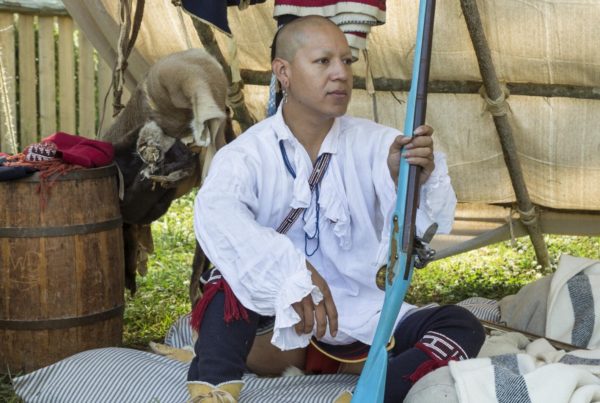
Human beings are accustomed, maybe even hard-wired, to make inferences based on names and appearances. So what assumptions might you make about an 18th-century man in Williamsburg named Charles Murphy?
For Kody Grant, who portrays Murphy, it’s an opportunity to explore his own sense of identity while interpreting 18th-century Native American attempts to preserve their autonomy in a time of Revolutionary change.
Murphy was born around 1742 in the Cherokee town of Settico, in the Overhill towns in present-day Tennessee. His mother was Cherokee, but his father was likely an Indian trader of Scottish descent.
What little we know about Murphy challenges easy characterization. He grew up in the Cherokee community, then spent several years as a teenager in Williamsburg, attending the Brafferton, the College of William & Mary’s Indian School.
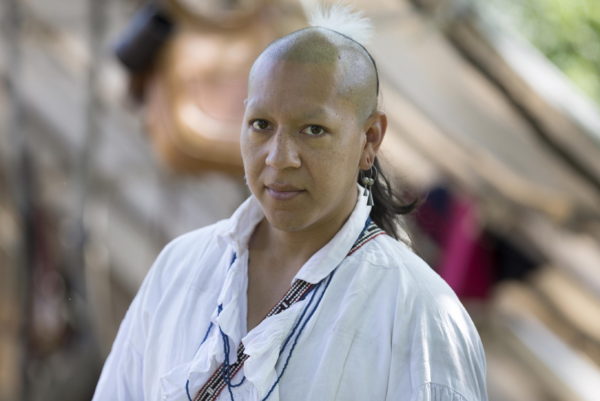
During the summer of 1776, with British support, Indian nations along the western colonial frontier from Virginia to Georgia launched attacks on white settlements. The colonists responded by destroying crops and devastating towns all through Cherokee country: Lower, Middle, and Overhill, particularly those believed to be loyal to Chief Dragging Canoe, who was leading the way.
Charles Murphy apparently took the side of the Virginians during this so-called Cherokee War, and he served as a translator during subsequent treaty negotiations. He was also enlisted for duty as an interpreter by Patrick Henry when he was governor, and for the Treaty of Dumplin Creek in 1785, when some Cherokee lands were ceded to the failed state of Franklin. (Franklin was an entity established in western North Carolina in an unsuccessful attempt to become the fourteenth U.S. state.)
To turn this bare-bones sketch into a three-dimensional character, Kody has drawn on the broad stories of how the Cherokee adapted to changing circumstances in the 18th century. The Cherokee had to navigate between various forces—colonies and states, British and French influence—in an effort to safeguard their own communities and maintain as much autonomy as possible.
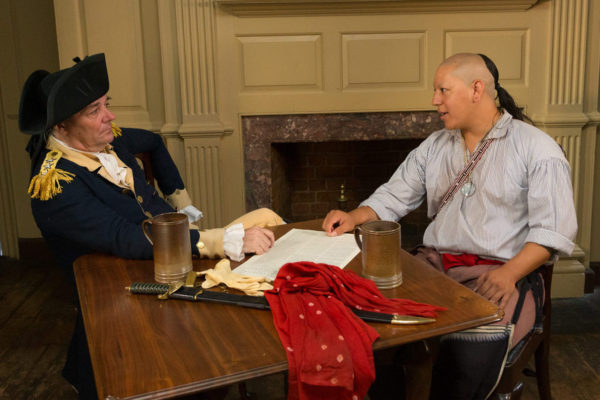
Kody considers Charles Murphy a classic go-between: a man able to make his way in two different words, to understand multiple perspectives, and to use his skills to get the most for his people.
Here’s where Kody has drawn on his own experience to flesh out the character. Kody’s mother was in the Navy, so he moved frequently as a kid. But since his father is Cherokee, he spent large portions of his summers in Cherokee, North Carolina before moving there when he was 19.
He explains that he relates to Charles on a gut level. Like Murphy, he says, he grew up making his way in very different kinds of communities. He knows that some students who received Western educations returned home only to realize they couldn’t take for granted a knowledge of cultural practices like language, celebrations, and community values. He assumes Murphy must have faced that kind of challenge.
Kody’s trips to Cherokee began an awakening. “I didn’t have the opportunity to learn those values and beliefs that are specific to my people until I moved to those communities and really immersed myself and worked to be a member of the community,” he says. “That is how I really relate myself to Charles. He was removed from his cultural surroundings to be educated elsewhere, and I definitely know there would have been some changes back home that he would have had to acclimate himself to.”
The video that follows is an imagined conversation at King’s Arms Tavern between Charles Murphy and George Washington which picks up on many of these themes. What assumptions do we make based on appearance? What is the meaning of loyalty? And how do you effectively make your way in two worlds?

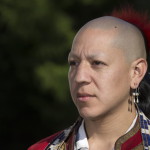
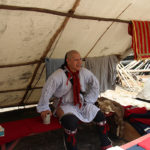
It is nice to see Native Americans interacting with the American colonists. The video is well done and illuminates some very important considerations on both sides. I hope to see more Native American programming at Colonial Williamsburg. Bravo to Kody Grant.
Native Americans have gotten the rawest of raw deals from our government. Informing our citizens of this is a small step towards apologizing for centuries of broken promises and mistreatment.
Nicely done! Each side represented well… Common ground found between the nations.